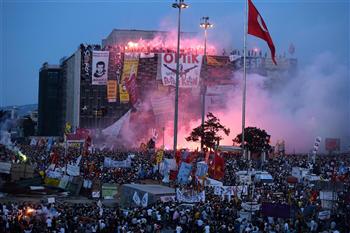Police Attacks Turkish Protesters
By Countercurrents.org
11 June, 2013
Countercurrents.org

Protesters supporting the Gezi Park demonstrations were subjected to police attacks overnight in cities, with tension especially rising in Adana and Ankara .
In Ankara , the protesting people suffered a harsh police barrage, with officers using water cannon and tear gas to disperse protesters. The protesters had to retreat to side streets as police forces attempted to empty the square.
Police also moved on the capital's Kugulu Park to dismantle tents set up in solidarity with the action continuing in Taksim-Gezi Park . Despite initial opposition, subsequent reports said the police took down the tents in the park.
Protesters in Adana also faced police attacks when they attempted to march toward Akkapi district in order to join another demonstrating group that had been subjected to violent behavior from a group of Justice and Development Party (AKP) supporters the night before.
Police denied permission to the group to march and called on the protesters to disperse. When the group refused, police intervened with water canons and tear gas, following protesters down to the end of Çakmak Street to completely disband the people.
Protests in Edirne and Izmir also gathered thousands of people in support of the Gezi Park demonstrations, with over 2,000 protesters marching in Edirne and 10,000 in Izmir. There was brief tension in Izmir stemming from opposing groups, but the problem was quickly resolved.
Istanbul 's working-class and predominantly Alevi neighborhood of Gazi continues to see heavy clashes with police.
Every night since the unrest began, thousands of people have gathered in the district of Sultanbeyli's Gazi neighborhood center, according to daily Radikal's report published on June 10.
The protesters use the same method as the Taksim occupiers, blocking the neighborhood's entrance with barricades and clashing with police to prevent an intervention in the protest.
Police officers used TOMA, a vehicle used to intervene in public incidents, water cannon, and tear gas to disperse the group.
Veli Gülsoy, the head of Gazi Cemevi (Alevi house of worship) said what was happening in the Gazi neighborhood was a reaction to the government by ordinary people, daily Radikal reported.
Gülsoy also said naming Istanbul 's third bridge after an Ottoman sultan historically known for slaughtering Alevis, “Yavuz Sultan Süleyman,” was an important reason for locals to riot.
“Now the situation in Gazi is even worse than what happened in 1995,” a member of the Socialist Democracy Party (SDP) was quoted as saying by the BBC's Turkish service.
“This is a politically motivated neighborhood, a politicized place. There is no single person here who did not taste tear gas,” Halil Sönmez, 25, member of the SDP, said.
A milestone for Turkey
The main opposition Republican People's Party's (CHP) Faruk Logoglu said the Gezi Park incidents were “a milestone” for Turkey .
“Previous generations, like my generation, think about you and your children's generation. Now the younger generations are shifting. They are laying a hand on my generation, protecting it too,” Logoglu said, maintaining that the Gezi Park incidents had the potential to change social paradigms.
“This is a very serious paradigm change. The responsibilities of the generations are, so to say, shifting. I find this positive. If we cannot protect it, it is positive that these youngsters living in this era more harmoniously and in mutual interaction are protecting it,” he said.
This process “will enrich society with a people's democracy, not as ballot-box democracy.”
For its part, the Peace and Democracy Party (BDP) argued that Erdogan, who conducted six separate rallies on June 9, 2013 against the Gezi Park protests, has not displayed the manner and responsibility which should have been shown by a prime minister during the protests.
“Until now, the prime minister's approach failed as far as his duties and responsibilities go. He rather [took the rostrum] as ‘the AK Party general chairman.' He started arranging rallies and events with feelings of revenge and he displayed an approach which would bring two segments of the society against each other. This is the wrong approach. The prime minister's responsibility is to keep the 76 million [population of Turkey ] all together,” BDP deputy Idris Baluken said.
“First the prime minister, then all AKP officials and deputies, should give up their insulting, threatening, arrogant and imperious approaches immediately. The prime minister should make an effort to understand what people on the streets are saying instead of organizing counter rallies. If the prime minister went to Gezi Park and listened to the people's requests on-site instead of staging separatist rallies in five different spots in Ankara , today, we might perhaps have come to a point where the tension in the streets had ended,” he said.
Source: Hürriyet Daily News, Dogan News Agency,
Comments are moderated


